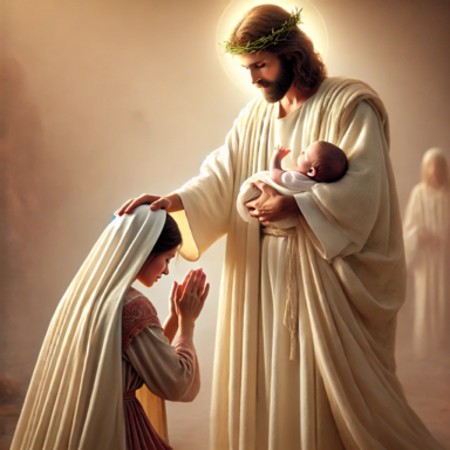MONDAY HOMILY: Throwing Jesus off the Cliff
FREE Catholic Classes
Am I willing to "throw Jesus off the cliff" in order to maintain the false illusion of mastery over my own life? This scene can be a powerful examination of conscience of each of us. Am I open to the Word of God in all its fullness, or do I try to re-fashion it according to my own wants and desires? Do I reject the Lord's teachings when they are inconvenient or difficult?
Highlights
Catholic Online (https://www.catholic.org)
3/5/2013 (1 decade ago)
Published in Year of Faith
Keywords: Daily Homily, Year of Faith, Gospel of St. Luke, Nazareth, The Will of God, Fr. Stephen B. Reynolds, St. Theresa Sugar Land
P>SUGAR LAND, TX (Catholic Online) During Christ's lifetime, perhaps 120-150 people lived in Nazareth. It was a small village, built on the side of a steep hill. Residents lived in houses of one or two rooms, often built in front of the caves that dotted the hillside. The cave was used as a stable, for storage, or as a workroom. The site had been unoccupied for centuries, but was repopulated after the Jewish Hasmonean revolt of the second century before Christ.
Among the settlers was a small tribe of Israelites, probably from Babylon, where their ancestors had been exiled centuries before. Settling in Galilee, they called their town "Nazareth," from the Hebrew word, "Nezer," meaning, "shoot" or "branch." The name evokes their descent from King David, and their tribe kept alive the prophecies uttered by Isaiah "there shall come forth a shoot from the stump of Jesse, and a branch shall grow out of his roots. And the Spirit of the Lord shall rest upon him" (Isaiah 11:1-2).
According to the late biblical scholar and archeologist Fr. Bargil Pixner, O.S.B., Jesus was called a Nazorean not because of his hometown, but because this title points to his royal descent.
We can therefore imagine something of the potent expectation that animated the village when Jesus returned to Nazareth. Even though St. Luke omits many of the details of this visit, the other Gospels tell us that for some time, Jesus had already been preaching and working miracles prior to his return home. His kinsmen would have seen in the mighty deeds of their relative the fulfillment of God's promises. They may have also been a little skeptical. "No prophet is accepted in his own native place" Jesus says (Luke 4:24).
After an initial favorable reception, the people of Nazareth reject Jesus in a violent and dramatic way: they try to kill him. "They rose up, drove him out of the town, and led him to the brow of the hill on which their town had been built, to hurl him down headlong" (Luke 4:29). Why this sudden turn against Jesus?
Perhaps Jesus' message was not what the Nazoreans expected. The Lord's mission was not to restore the prestige of his ancestral house, but to proclaim the message of salvation. We can imagine that some of Jesus' extended family of was hoping that their moment in the sun had finally arrived.
In much of the ancient world, as in many places today, success is achieved not "by what you know" but "by who you know." Confronted with a legitimate claimant to the throne of King David, some of Jesus' kinsmen may have been fantasizing how this man would restore the fame and fortune of their family, in which they would naturally share. Jesus burst the bubble of their unrealistic expectations.
The Nazoreans - at least those who led the charge to do away with Jesus - were turned inward, looking to their own interest. On the other hand, Jesus is oriented toward others: first to the will of his Father, then to the salvation of the world. He wants his clan to be saved, not enriched.
This brush with death anticipates the rejection that Jesus will suffer from the hands of his own nation and the death that will be meted out to him.
The Lords' effortless escape from the violent hands of his persecutors also demonstrates that he exercises absolute sovereignty over the unfolding of his passion and death. Jesus is not simply an innocent victim of unfortunate circumstance. "No one takes [my life] from me, but I lay it down of my own accord. I have power to lay it down, and I have power to take it again; this charge I have received from my Father" (John 10:18).
This scene can be a powerful examination of conscience of each of us. Am I open to the Word of God in all its fullness, or do I try to re-fashion it according to my own wants and desires? Do I reject the Lord's teachings when they are inconvenient or difficult? Am I willing to "throw Jesus off the cliff" in order to maintain the false illusion of mastery over my own life?
Even when the Gospel is difficult to embrace, even when it challenges us mightily, we ought to strive to echo the sentiments of St. Peter, "Lord, to whom shall we go? You have the words of eternal life" (John 6:68).
-----
Fr. Stephen B. Reynolds is pastor of St. Theresa Catholic Church in Sugar Land, TX, a suburb of Houston. You may visit the parish website at: www.SugarLandCatholic.com.
---
'Help Give every Student and Teacher FREE resources for a world-class Moral Catholic Education'
Copyright 2021 - Distributed by Catholic Online
Join the Movement
When you sign up below, you don't just join an email list - you're joining an entire movement for Free world class Catholic education.

-

-
Mysteries of the Rosary
-
St. Faustina Kowalska
-
Litany of the Blessed Virgin Mary
-
Saint of the Day for Wednesday, Oct 4th, 2023
-
Popular Saints
-
St. Francis of Assisi
-
Bible
-
Female / Women Saints
-
7 Morning Prayers you need to get your day started with God
-
Litany of the Blessed Virgin Mary
Celebrate Sunday Mass - 12.15.24
-

The Day Prayer Left the Classroom: Why It Should Never Have Happened
-

Do Aborted, Stillborn, and Miscarried Babies Go to Heaven?
-
Celebrating St. Juan Diego: The Man Chosen by Our Lady of Guadalupe
-
The Solemnity of The Immaculate Conception: The Virgin Mary Lights The Path To A Fruitful Advent
Daily Catholic
 Daily Readings for Tuesday, December 17, 2024
Daily Readings for Tuesday, December 17, 2024 St. Olympias: Saint of the Day for Tuesday, December 17, 2024
St. Olympias: Saint of the Day for Tuesday, December 17, 2024 A Devotion in Honour of the Seven Sorrows and Joys of Saint Joseph: Prayer of the Day for Tuesday, December 17, 2024
A Devotion in Honour of the Seven Sorrows and Joys of Saint Joseph: Prayer of the Day for Tuesday, December 17, 2024- Daily Readings for Monday, December 16, 2024
- St. Ado of Vienne: Saint of the Day for Monday, December 16, 2024
- Be with Me Today, O Lord: Prayer of the Day for Monday, December 16, 2024
![]()
Copyright 2024 Catholic Online. All materials contained on this site, whether written, audible or visual are the exclusive property of Catholic Online and are protected under U.S. and International copyright laws, © Copyright 2024 Catholic Online. Any unauthorized use, without prior written consent of Catholic Online is strictly forbidden and prohibited.
Catholic Online is a Project of Your Catholic Voice Foundation, a Not-for-Profit Corporation. Your Catholic Voice Foundation has been granted a recognition of tax exemption under Section 501(c)(3) of the Internal Revenue Code. Federal Tax Identification Number: 81-0596847. Your gift is tax-deductible as allowed by law.






 Daily Readings for Tuesday, December 17, 2024
Daily Readings for Tuesday, December 17, 2024 St. Olympias: Saint of the Day for Tuesday, December 17, 2024
St. Olympias: Saint of the Day for Tuesday, December 17, 2024 A Devotion in Honour of the Seven Sorrows and Joys of Saint Joseph: Prayer of the Day for Tuesday, December 17, 2024
A Devotion in Honour of the Seven Sorrows and Joys of Saint Joseph: Prayer of the Day for Tuesday, December 17, 2024

